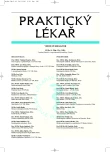-
Medical journals
- Career
Successful treatment of acute liver failure by means of artificial liver support device „Prometheus“ with following liver transplantation.
Authors: E. Kieslichová 1; M. Ročeň 1; P. Trunečka 2; L. Janoušek 3; J. Šperl 2; J. Petrášek 2; Š. Vítko 4
Authors‘ workplace: Klinika anesteziologie, resuscitace a intenzivní péče, Transplantcentrum, IKEM, Praha, přednosta MUDr. E. Kieslichová 1; Klinika hepatogastroenterologie, Transplantcentrum, IKEM, Praha, přednosta doc. MUDr. J. Špičák, CSc. 2; Klinika transplantační chirurgie, Transplantcentrum, IKEM, Praha, přednosta doc. MUDr. M. Adamec, CSc. 3; Transplantcentrum IKEM, Praha, přednosta MUDr. Š. Vítko, CSc. 4
Published in: Prakt. Lék. 2006; 86(5): 275-277
Category: Case Report
Overview
Acute (fulminant) liver failure is defined as a sudden onset of icterus, severe coagulopathy and encephalopathy in a patient without previous symptoms of liver disease. The condition is potentially reversible due to the high regenerative capacity of the liver; however a significant proportion of patients has no chance of survival without prompt liver transplantation. Despite of all the advances in medicine, liver failure is still associated with high mortality. The complex treatment of acute liver failure consists of therapy of intracranial hypertension, stabilisation of circulation, ensuring appropriate ventilation and oxygenation, nutritional support and maintenance of metabolic homeostasis, specific treatment of infections. Time is the most important factor for survival. It is necessary to recognize the disease early, start the treatment and contact a liver centre that performs liver transplantation. As the transport of a patient with hepatic encephalopathy is associated with a high risk, it is necessary to refer the patient early, preferably in stage I or II of hepatic encephalopathy. Artificial liver support, although not yet a standard part of the treatment protocol, may prolong the period when the patient’s condition is still suitable for liver transplantation. In July 2005, the “Prometheus” device, which works on the principle of fractionated plasma separation and adsorption, was used for the first time in a patient with acute liver failure in the Czech Republic.
Key words:
acute liver failure, Budd-Chiari syndrome, artificial liver support, „Prometheus“, liver transplant.
Labels
General practitioner for children and adolescents General practitioner for adults
Article was published inGeneral Practitioner

2006 Issue 5-
All articles in this issue
- Present-day population health in selected European countries in relation to basic characteristics of socio-economic development
- What is not the flu
- Screening of colorectal cancer – reality and perspectives
- Congenital syphilis again on the scene worldwide. II. Clinical picture.
- Signification of Cataract Surgery for Patients of the Age 80 Years and Older
- Negative pressure wound therapy at patients with diabetic foot. (Vacuum Assisted Closure)
- Metastasis of kidney cancer to breast gland
- Pulmonary aspergillosis – a fatal complication in a patient suffering acute promyelocytic leukemis
- Successful treatment of acute liver failure by means of artificial liver support device „Prometheus“ with following liver transplantation.
- Temporal arteritis and polymyalgia rheumatica – an acute condition in rheumatology.
- Effect of piracetam on severe vascular type dementia symptoms – nonintervention retrospective follow-up
- Expectations of medicine students from the physician’s role.
- The delirium states at gerontopsychiatric wards
- The stigma of somatising patientThe stigma of somatising patient
- General Practitioner
- Journal archive
- Current issue
- Online only
- About the journal
Most read in this issue- Temporal arteritis and polymyalgia rheumatica – an acute condition in rheumatology.
- Congenital syphilis again on the scene worldwide. II. Clinical picture.
- Negative pressure wound therapy at patients with diabetic foot. (Vacuum Assisted Closure)
- Effect of piracetam on severe vascular type dementia symptoms – nonintervention retrospective follow-up
Login#ADS_BOTTOM_SCRIPTS#Forgotten passwordEnter the email address that you registered with. We will send you instructions on how to set a new password.
- Career

